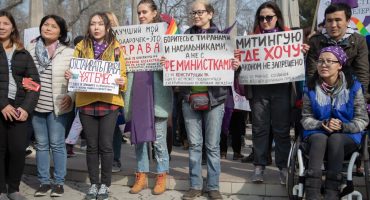In Tajikistan, an increase in the child labor and juvenile crime rates is expected due to the deterioration in the socio-economic conditions of the families caused by the economic crisis during the COVID-19 pandemic.
Follow us on LinkedIn
Experts believe that the reduction of labor migrants’ remittances and the economic crisis during the pandemic will force the minors with no means of support to commit theft or work to provide for themselves.
Juvenile crime was always concerning the Tajik authorities. In recent years, mass fights with the use of bladed weapons among schoolchildren were reported quite often in the media.

Avliyo Fayzzoda, Head of the Organizational and Analytical Department for the Prevention of Juvenile Crimes of the Ministry of Internal Affairs. CABAR.asia
The Head of the Organizational and Analytical Department for the Prevention of Juvenile Crimes of the Ministry of Internal Affairs Avliyo Fayzzoda said that during the first quarter of this year, 314 juvenile crimes were identified in the country, including fraud, robbery, hooliganism and other crimes. Most of all, thefts were registered – 214 cases.
Although, compared with the same period of the previous year, there is a slight decrease in the crime rate – by 6 cases or 1.8%. This is explained by the fact that the markets did not work for almost two months during the pandemic, and people were self-isolating in the spring.
Deteriorated situation during the economic crisis already led to an increase in the number of working children in the country. Markets and parking lots are full of teenagers offering help in carrying goods, washing the car, or providing some other service for a small fee.
Sino Junaydov (not his real name) should study in 10th grade, but he dropped out of school due to difficult living conditions. When he was four, his parents divorced. Currently, he and his mother live in one of Dushanbe districts. For more than five years, he has been making money by inviting clients to board a taxi from Dushanbe to Vahdat and other capital’s districts:
Sino Junaydov is one of many boys who work during the pandemic to make a living, despite being detained by the police several times after special raids.
“Several times, the police officers took me to the police station, my mother came for me, and they let me go. There is simply no one to take care of my mother. If there are raids again, I will run away again. I think, even the police officers are tired of me,” he says with a smile.
Many minors who work in the cities selling plastic bags, carrying goods on carts in the markets, etc. come from the poor families or do not have fathers. In Tajikistan, the boys traditionally have to provide for their families, even if they are not yet of working age.
According to the Organizational and Analytical Department for the Prevention of Juvenile Crimes of the Ministry of Internal Affairs, throughout the republic, the raids for the detention of minors engaged in vagrancy and beggary were carried out 2,317 times this year.
All these children start working at the age of 10–12, and even earlier sometimes. Experts believe that if the children earn money from an early age and do what they want, they get used to the fact that they own money. Early independence does not always benefit the children, their mentality is not yet stable, older people can involve them in crimes.
“Minors who study badly at school and do not follow school rules are kicked out by teachers after the 9th grade. [In Tajikistan, compulsory school attendance requires studying only up to the 9th grade. Complete school education includes 11 grades]. They go outside the school to meet other young people without morals. If the parents do not control them, Allah alone knows what they are doing!” said Fayzzoda.
Sociologist Daler Bahrombekov, associate professor of the Department of Sociology at the Tajik National University, believes that children left without adult supervision start an independent life early and feel responsible for adults, which leads to the dysfunction.
“Such children’s parents are in labor migration, they leave their children to the relatives’ care, mainly grandmothers and grandfathers. Grandmother and grandfather are aging and hardly raise their grandchildren. In addition, their closest relatives also began to live independently early. Children imitate the adults’ behavior,” he says.

Daler Bahrombekov, associate professor of the Department of Sociology at the Tajik National University. CABAR.asia
Another aspect of this dysfunction is the collision of the interests of the family institution and the education system, Bahrombekov believes.
“The family, represented by the parents, sees their function only in the financial support of children. At school, they say, “We teach, he learns for himself and his parents. If he does not want to study, this is their problem then”. Thus, delegating the problems of raising a child to each other, after all, the adults put the responsibility on the children themselves,” Bahrombekov said.
In his opinion, juvenile crimes of minors without adult supervision have increased. According to the expert’s observations, the main factor in the growth of homelessness rate is the labor migration process, which negatively affects the children’s growth. Now, when household incomes are declining since migrant workers cannot find jobs in migration, the situation will aggravate.
According to the expert, another reason why children have to start working early or loiter is the mentality of having many children, which leads to poverty and neglect of children. On average, there are four children in Tajik families. Despite the fact that this indicator is lower in cities, large families with 5 and more children are common in Tajikistan.
The experts also believe that the availability of violent computer games influences the increase in juvenile crimes.
“According to our statistical analysis, most mass fights are caused by watching and playing violent games in computer centers. These games affect children. Recently, the number of knife fights has increased. There were no such fights in previous years,” Fayzzoda said.
Bahrombekov agrees with this statement and believes that the lack of parental control over Internet use by children also affects juvenile crime.
“Think about how many family problems were caused by mobile phones. Children are ahead of their parents in using it. That is, there is no more social control. Since the teenagers are more socially active in their social reality,” he said.
In 2011, Tajikistan adopted the Law “On Parents’ Responsibility for Children’s Upbringing and Education”. According to the Ministry of Internal Affairs, in 2020, the parents were fined for about 460,000 somoni ($46,000), each fine ranging from 120 to 160 somoni ($12 to 16).
According to Fayzzoda, the courts considered the parents’ situation with understanding, warned them and released most of them from liability without fines, depending on the conditions – since some of the kids are incomplete orphans who do not have a father and provide for their families.
“When we bring these minors to the police departments, we acknowledge them in the presence of their parents or persons replacing them. We release most of these minors when we see the conditions in which they live,” said the specialist from the Ministry of Internal Affairs.
This Ministry’s representative calls on all parents not to leave their children unattended and to create conditions for their education.

Sarvar Kholikzoda, Head of the Department of Legislation and Fundamentals of Constitutional Defense and Security at the Ministry of Justice. CABAR.asia
Meanwhile, Sarvar Kholikzoda, the Head of the Department of Legislation and Fundamentals of Constitutional Defense and Security at the Ministry of Justice, insists that the parents are obliged to take care of their children in accordance with the parental responsibility law. Minors are not allowed to work on the streets and earn money, the law restricts this, and parents of minors are held accountable.
In case if a child is left without parents or one of them is alive, but is deprived of custody, according to the Family Code of the country, the national commissions on the rights of the child in each city and district are obliged to control such children.
“The tasks of these commissions are to prepare and provide information on the identification and registration of homeless children within three days in accordance with Resolution 419, adopted in 2016. These commissions are then obliged to place children in special institutions or boarding schools, whose activities are aimed at providing children with state benefits. Then, they make sure that the children’s rights are not violated after they are placed there,” Kholikzoda said.
To reduce the crime level and prevent the minors’ involvement in labor activity, all ministries and departments dealing with the problems of minors and youth should boost their activities, according to Kholikzoda. When the children are on a school break, they do not engage in any additional activities, but simply stay outside.
“Today, we need to improve the efficiency of continuing education centers, sports clubs, libraries and other institutions to involve these minors in education. In this case, we can succeed,” he said.
According to the Civil Code of Tajikistan, anyone under 18 is considered a minor. Sino, who will turn 18 in a year, wants to enroll in the university, but says that he cannot read and write well.
“I cannot study anywhere, because I have no opportunities. I do not even have a high school diploma. In fact, my future is uncertain,” he said.
If you have found a spelling error, please, notify us by selecting that text and pressing Ctrl+Enter.







